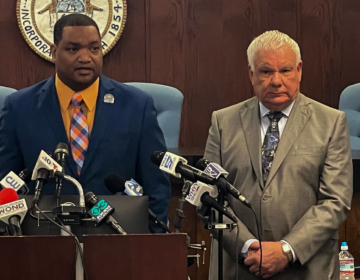N.J. Supreme Court takes case of funeral director fired for using medical marijuana
The N.J. Supreme Court will hear the case of a man who was fired from his job as a funeral director after his employer found out he used medical marijuana to treat his cancer.

A New Jersey appeals court found in March that the state’s medical marijuana law did not block employers from firing workers who use medical marijuana. (Brennan Linsley/AP Photo)
The New Jersey Supreme Court will hear the case of a man who was fired from his job as a funeral director after his employer found out he used medical marijuana to treat his cancer.
It comes not long after Gov. Phil Murphy signed into law an overhaul of the state’s medical-marijuana program that deals in part with employee protections.
“It strikes me that it’s disability discrimination to terminate a disabled person who tests positive for medical marijuana even though there’s no claim that the employee was using marijuana on work hours,” said Elizabeth Zuckerman, an employment attorney who wrote an amicus brief in this case.
While working a May 2016 funeral, Justin Wild was driving a vehicle that was struck by another vehicle that ran a stop sign, according to court documents.
At the hospital, Wild told a doctor that he used medical marijuana, and the doctor said he did not appear intoxicated.
But once his employer Carriage Funeral Holdings found out that Wild used medical marijuana, they insisted he take a blood test. The test was positive for marijuana, and Wild was fired.
A New Jersey appeals court found in March that the state’s medical marijuana law did not block employers from firing workers who use medical marijuana, but the judges also suggested that Wild may have been protected by the state’s Law Against Discrimination because he had cancer.
Four months later, in July, Gov. Phil Murphy signed an overhaul of the state’s medical marijuana law, which included new employment protections for patients. That law bars employers from firing workers simply for being legal medical marijuana patients, but it still lets them terminate employees who use the drug at work or are impaired on the job.
It is unclear how the new law will affect Wild’s case.
Attorneys for Carriage Funeral Holdings did not reply to a request for comment.
Employment lawyers say many more companies accept that some workers will need to use medical marijuana for legitimate health reasons.
“If they’re impaired during the day while they’re working, certainly that’s of concern,” said Julie Werner, a partner at the law firm Lowenstein Sandler. “[But] I think really companies are focused on whether or not employees can do their jobs.”
Oral arguments in the case have not yet been scheduled.
WHYY is your source for fact-based, in-depth journalism and information. As a nonprofit organization, we rely on financial support from readers like you. Please give today.




